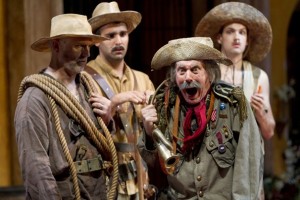Shakespeare Theatre’s ‘Much Ado’ raises question of Latino stereotypes
 The company in reference to the Latino characters in the story had decided to use the names, Juan Huevos and Jose Frijoles. The names have since changed after complaints by Latino audiences. The company is also accused of biased casting. What do YOU think? Is this enough or too far?
The company in reference to the Latino characters in the story had decided to use the names, Juan Huevos and Jose Frijoles. The names have since changed after complaints by Latino audiences. The company is also accused of biased casting. What do YOU think? Is this enough or too far?
####
Reversing a decision that had enraged Latino playwrights, directors and others, the Shakespeare Theatre Company has taken the unusual step of restoring in mid-run the original names of two characters that had been changed for its Cuban-set production of “Much Ado About Nothing.”
As a result, the programs for the show will be altered as of Thursday to include the names Shakespeare had given to the two minor characters, Hugh Oatcake and George Seacoal. For the first few weeks of the run, which began Nov. 25, the characters used names that had been made up by director Ethan McSweeny: Juan Huevos and Jose Frijoles. The names were considered demeaning and even derogatory by Latino theater artists, who wrote of their displeasure to artistic director Michael Kahn.
Kahn said in an interview on Friday that in consultation with McSweeny — who is traveling in Peru — using the Spanish words for “eggs” and “beans” as the characters’ names had been dropped. (Initially, one of the two characters had been listed on the troupe’s Web site as Juan Arroz, so that the names were “rice” and “beans.” “Huevos” was later substituted for “Arroz.”)
“There’s no need to offend anybody with that,” Kahn said. “I’m very conscious of what would be offensive. We sort of prided ourselves on not doing anything like that. This was obviously an inadvertent mistake and it certainly has raised my consciousness of what can be a slight.”
Some of those who had objected to the names praised Kahn and McSweeny for acknowledging the error and returning to Shakespearean names for the characters played by actors Phil Hosford and Carlos J. Gonzalez. “I’m really glad that reason has prevailed,” said Tlaloc Rivas, a Mexican American director based in St. Louis and one of several Latino artists who either wrote to Kahn or contributed to extensive online discussions. Among those upset with some of the production’s choices were other artists with deep ties to Washington’s theater community, including the directors Jose Carrasquillo and Michael John Garces and dramatist Karen Zacarias.
Carrasquillo, who recently directed Theater J’s well-received revival of Arthur Miller’s “After the Fall,” told Kahn in a letter that names such as Frijoles “feel like leftover stereotypes,” and that if this “Much Ado” had been set in the antebellum South, “I know that Johnny Fried Chicken or Johnny Gumbo wouldn’t have made it to the stage.”
Conceptual transplants of Shakespeare’s plays have become so routine that “Macbeth” would have to be set in the Stone Age to surprise an audience with temporal or geographical tinkering. In the case of Shakespeare Theatre’s “Much Ado,” McSweeney shifted the eternal battle of wits between Benedick and Beatrice to a sugar plantation in 1930s Cuba. He has explained in promotional material for the show and online videos that he was intrigued by a previous Cuba-inspired staging of “Much Ado” that he’d seen, and by the hierarchical nature of Cuban society at the time, with its emphases on status and machismo.












Be the first to comment
Sign in with